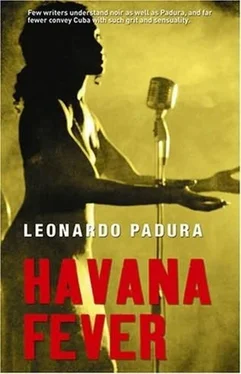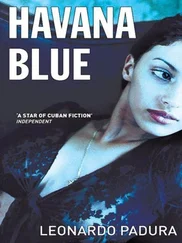Leonardo Padura - Havana Fever
Здесь есть возможность читать онлайн «Leonardo Padura - Havana Fever» весь текст электронной книги совершенно бесплатно (целиком полную версию без сокращений). В некоторых случаях можно слушать аудио, скачать через торрент в формате fb2 и присутствует краткое содержание. Жанр: Триллер, на английском языке. Описание произведения, (предисловие) а так же отзывы посетителей доступны на портале библиотеки ЛибКат.
- Название:Havana Fever
- Автор:
- Жанр:
- Год:неизвестен
- ISBN:нет данных
- Рейтинг книги:3 / 5. Голосов: 1
-
Избранное:Добавить в избранное
- Отзывы:
-
Ваша оценка:
- 60
- 1
- 2
- 3
- 4
- 5
Havana Fever: краткое содержание, описание и аннотация
Предлагаем к чтению аннотацию, описание, краткое содержание или предисловие (зависит от того, что написал сам автор книги «Havana Fever»). Если вы не нашли необходимую информацию о книге — напишите в комментариях, мы постараемся отыскать её.
Havana Fever — читать онлайн бесплатно полную книгу (весь текст) целиком
Ниже представлен текст книги, разбитый по страницам. Система сохранения места последней прочитанной страницы, позволяет с удобством читать онлайн бесплатно книгу «Havana Fever», без необходимости каждый раз заново искать на чём Вы остановились. Поставьте закладку, и сможете в любой момент перейти на страницу, на которой закончили чтение.
Интервал:
Закладка:
“But the Count’s gone off on another tack,” concluded the captain.
“And I’m more certain than ever that something out of the ordinary happened forty-three years ago,” the Count announced.
“Forty-three years ago?” Rangel enthused in policeman style, and puffed on his cheroot.
“Do remember you once talked to me about a lieutenant called Aragón?”
“Of course I do, he was my first boss. He was something special.”
“Well Lieutenant Aragón left a case open forty-three years ago…”
“The case of the woman who used cyanide to kill herself?” asked Rangel, taken aback.
“How did you guess?” the Count was even more taken aback than his ex-boss.
“Because Aragón said it was the only one he never solved. After several months of investigations, his boss ordered him to call it a day. There was a lot of evidence pointing to suicide, but Aragón insisted something strange had happened and wanted to keep on the case…”
“Something really strange did happen,” the Count agreed with Aragón.
“Go on then, tell me what happened, and see if I get it.”
“Aragón followed orders and shelved the investigation, but had the forethought not to close the case,” the Count went on. “That’s why it took us so long to find the dossier, because we thought it must have been closed. They’re looking out the rest of the paperwork, and the autopsy report, but in the précis we’ve got it says the woman died from a lethal intake of cyanide, although there were remains of antibiotics in her stomach… Aragón reckoned someone who’s about to commit suicide doesn’t bother taking antibiotics to cure a throat infection. He was sure it was murder, but had no way of proving it, and needed time to investigate… From what I’ve found out, I agree the woman was murdered, perhaps because she was privy to some serious inside information. Just imagine, her lover and Meyer Lansky were as thick as thieves… So we came to see you. I wanted to set you thinking, you must remember something Aragón told you about that case…”
The ex-major put his cigar on the ashtray and looked into the garden. The Count knew Rangel’s memory stored a huge amount of information, and his neurones must now be digging deep into memories of years of conversations with a prehistoric policeman whose infallibility was legendary.
“The woman was young and very beautiful. She was a singer…” said Rangel, returning the Count’s glance. “And Aragón couldn’t find any motives for suicide or murder for that matter. Those most under suspicion had no incriminating motives and there were fingerprints belonging to several people in the house, but all had watertight alibis… The deceased had everything ready to leave the country, even a visa in her passport, and was leaving with a man who’d been her lover for several years. Lansky’s partner?”
“Uh-huh, that’s him. You’re on the right track,” the Count encouraged him.
“Aragón told me a couple of things had surprised him: that the girl didn’t seem to have any friends and that her lover left Cuba three weeks after her suicide. It also struck him as odd she put her own record on the turntable before committing suicide… Wait a minute, I remember what was most suspicious of all was that she diluted the cyanide in cough syrup… He reckoned if you’re set on killing yourself, you swallow the poison, and don’t bother diluting it in medicine.”
“She was murdered. I’ve been sure of that for some time,” declared the Count triumphantly.
“Aragón was sure, if he’d had more time, he’d have found more leads, but we’re talking 1959, no, it was 1960 by then, when the acts of sabotage started and there weren’t enough detectives to go round. That’s why he was told to forget the singer and get on with other cases. Apart from that, there were no relatives or anyone demanding to know what really happened, and he had no suspects… But I don’t understand why you’re so keen connect that death with the murder of the man who was into books.”
Conde smiled and took a drag on his cigar.
“Now I know they murdered her. First it was just a hunch…”
“I don’t believe it, Conde, are you still banging on about your hunches?”
“Well what do you expect, Boss: when I really have a hunch… That woman’s lover owned the library the Ferreros inherited.”
“And he?-”
“He died in 1961,” interjected Manolo, to show how crazy the Count was. “A car accident, in the United States.”
“So?” rasped Rangel.
“So?” mimicked the Count. “Well, I’ll continue with investigations, because I agree with Aragón: Violeta del Río didn’t commit suicide and I’m sure that someone connected to that mystery murdered Dionisio Ferrero. What do you reckon? If they hadn’t killed Dionisio, nobody else would have taken a blind bit of interest in Violeta del Río.”
Rangel and Manolo looked at each other. They’d have liked to crack a joke, but experience urged caution: the Count’s hunches usually had surprising links to reality. Old Rangel contemplated his cigar and smiled.
“Conde, it’s ten years since I asked you this… and I won’t die without getting a proper answer from you. Why the hell did a fellow like you join the police?”
Conde smoked his cigar, with a slightly sarcastic smile, prompted by cherished memories.
“Truly, truly, I didn’t know why for a long time,” he said, no longer smiling. “Although I sometimes liked what I was doing, I hardly ever felt happy as a policeman. Then I decided it was the fault of those bastards who do things and usually get away with it… But then, when I saw what was happening in the big, wide world, I think I imagined I’d sort it out a bit so it wasn’t so fucked up, and I swallowed the story about police being able to do that. A romantic dream, right? I know I was swimming against the tide, but I don’t regret what I did, although I’d never do it again. I’d not enlist again, even at gunpoint. Not even with a chief like you. I used to be agnostic, but I’m a total disbeliever now… Boss, I don’t even believe in the four noble truths a friend of mine talks about… At most, in friendship, memories and a few books. It may sound cynical, but it’s the truth. I don’t like what I see every day and couldn’t cope with it if I was in the force. I feel happier selling old books, wielding no power over others and being at ease with myself. At forty-eight I’ve learned that’s important too. When I can, I enjoy the small pleasures in life, as faraway as I can possibly be from any whiff of power and the idea I have a right to think on behalf of other people and having to obey orders I sometimes didn’t want to obey. You see? I’m much clearer about why I don’t want to be a policeman than why I was one for ten years.”
He abandoned his bed feeling as if he’d had another encounter with his friend J.D., though this time he didn’t remember the essence of their dialogue: meditation and reincarnation. I expect, the bastard’s into all that and doesn’t want to write, he thought, while trying to get up as surreptitiously as his aches and pains would allow so as not to wake up Tamara. Back on his feet, he turned round and fleetingly observed the sleeping woman, her mouth slightly open, her nightdress rucked up, baring thighs as firm as ever as they climbed to the promising mound of her buttocks. Conde bent over, breathed in and filled his lungs with the smell of hot sheets and sweet saliva, ruffled hair and female vapours from that almost inert body and was surprised by the thought that he’d now crossed every frontier of self-preservation because he unreservedly loved a woman he felt to be his own, with whom he’d exchanged the most intimate secrets. He recalled the almost inaudible splash of Tamara’s tongue in the well of her mouth and the seemingly pitiful purr she’d emit seconds before passing from wakefulness to sleep, and, when she lapsed definitively into unconsciousness, the way her body juddered and alarmed the Count. For her part, she was familiar with and suffered from the night-time snoring of a smoker with one nostril blocked from when a baseball hit him long ago, from the anxiety pursuing him in his deepest dreams, which, so she said, made him assume strange postures like sleeping face down, leaning on his elbows his forehead against the pillow, as if enduring a Muslim form of penitence. The quota of secrets they shared from years of passionate encounters encompassed knowledge of phobias and fears, of things admired and held in contempt, and the vital possession of the most subtle, efficient keys to release the springs of sexual pleasure. The Count recalled how she liked his tongue to lick her clitoris in quick violent movements, letting his saliva run down to her vaginal and anal orifices, as the palms of his hands rubbed her erect nipples and he finally felt the tension in her belly, the changes in her breathing, the build up to the silent eruption of her orgasm. Then he felt his scrotum recede and a lascivious tingle run down his urethra, and pleasurably recalled the arts applied by Tamara to give him maximum enjoyment, licking his nipples, caressing his anal sphincter, revisiting his penis and testicles with her tongue and, opening her legs so that, when he knelt and penetrated her, he could eye her pink fleshy parts wet with saliva and tasty secretions, and watch his honourable member drill the hot insides of a body surrendering wholeheartedly to love and pleasure.
Читать дальшеИнтервал:
Закладка:
Похожие книги на «Havana Fever»
Представляем Вашему вниманию похожие книги на «Havana Fever» списком для выбора. Мы отобрали схожую по названию и смыслу литературу в надежде предоставить читателям больше вариантов отыскать новые, интересные, ещё непрочитанные произведения.
Обсуждение, отзывы о книге «Havana Fever» и просто собственные мнения читателей. Оставьте ваши комментарии, напишите, что Вы думаете о произведении, его смысле или главных героях. Укажите что конкретно понравилось, а что нет, и почему Вы так считаете.











